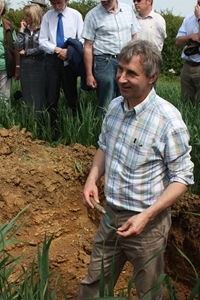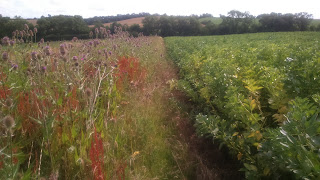
The United Nations has declared 2015 as the International Year of Soils with the aim of helping to raise awareness of why soils are important for food security and the environment. By its very nature without this essential element we would not be able to grow food, provide wildlife habitats, prevent flooding or have clean water.
Celebrating this theme, the National Farmers Union (NFU) together with the
GWCT’s Allerton Project in Leicestershire, held a thought-provoking event with a range of experts explaining the latest research findings on soil research as well as describing how cultivation and innovation is helping farmers lead the way to achieve healthy soils for the benefit of the environment, crop yields and people.
Attended by nearly 50 farmers, NFU members, industry advisers, researchers and policy makers, including representatives from Defra and the Environment Agency, this important event was chaired by Minette Batters, deputy president of the NFU who started by saying “The Year of Soils is a vital opportunity for the NFU to showcase some of the amazing work that farmers are doing.”
Similarly, Phil Jarvis of GWCT started his presentation by stating “Farmers do a lot for soil and the environment and don’t shout loud enough about it.” This view was mirrored by all the expert speakers who presented their current research findings on managing soil which included Dr Alastair Leake from the GWCT Allerton Project, Dr Ron Stobart from NIAB TAG and Ian Matts from Yara. In addition, Richard Bramley, farmer and NFU Environment Forum member, gave a detailed insight into the challenges and benefits of managing his soil sustainably from personal experience on his own farm in Yorkshire.
The audience heard how research and current practice was working to overcome problems such as soil erosion, compaction and flooding by adopting emerging techniques such as strip and min-till, to more established practices such as cover crops, buffer strips and beetle banks .
The discussions which followed focussed on the future challenges facing soil management including what farmers, researchers and policy makers should do to bring agriculture back into the limelight. Dr Alastair Leake from the GWCT’s Allerton Project highlighted how soil management can make farmers resilient to climate change by adding, “Changes to cultivation techniques can help to build a resilient soil, that can withstand more frequent and exceptional weather events such as rainfall and drought. This will be vital as we go forward so that we can continue to farm our food efficiently while caring for the environment.”
Minette Batters, summed up at the end of the event saying "The year of the soils is a vital opportunity for the NFU to showcase some of the amazing work that farmers are doing. Soil is the most important asset of any farm, and it's very clear from the farmers here today that it's their absolute priority to look after it.
“This event at the Allerton Project has shown how food production works in harmony, as well as enhancing the farmed environment. I am therefore delighted that this government has committed to a long term food and farming strategy. This is essential if we are going to have sustainable, resilient farms that can manage climate change whilst continuing to produce food and care for our treasured environment." Mrs Batters, went on to add, "With a UK population of 60 million people, set to rise to 70 million in the next decade, food and farming needed to be at the heart of Government and that the A in Defra should once again stand for agriculture.”
The afternoon session involved a tour of the Allerton Project Farm to see research in action which stimulated much conversation about the differencing soil management practices utilised across the diverse soil types in the UK. Sited amongst the productive fields were examples of machinery – Sumo, Dale and Claydon drills that are used by the Allerton project to direct drill seeds into the untilled land. A deep soil pit in a field of Spring Oats enabled Alastair Leake to explain the layers of the soil, the significance of burrowing, feeding and casting of earthworms and their ability to help withstand extreme weather events
Richard Barnes, from seed suppliers Kings was also on hand to explain work on cover crops and how these are an important part of the mix to ensure soil health. Top of the cover crops with Richard are currently radish, vetch, rye, oats, phacelia and buckwheat. These seed mixes produce a diverse range of soil crops which in-time reduce soil compaction and improve structure.
Concluding the day, Jim Egan from the Allerton Project and co-ordinator of the event said, “There are lots of farmers doing good things and they are learning about new techniques and challenges all the time. But to pull this all together we need practical research and demonstration and we saw that in ample amounts at this event today.”
The NFU and GWCT are grateful for the sponsorship provided by Yara and Kings.






































 The United Nations has declared 2015 as the International Year of Soils with the aim of helping to raise awareness of why soils are important for food security and the environment. By its very nature without this essential element we would not be able to grow food, provide wildlife habitats, prevent flooding or have clean water.
The United Nations has declared 2015 as the International Year of Soils with the aim of helping to raise awareness of why soils are important for food security and the environment. By its very nature without this essential element we would not be able to grow food, provide wildlife habitats, prevent flooding or have clean water.










